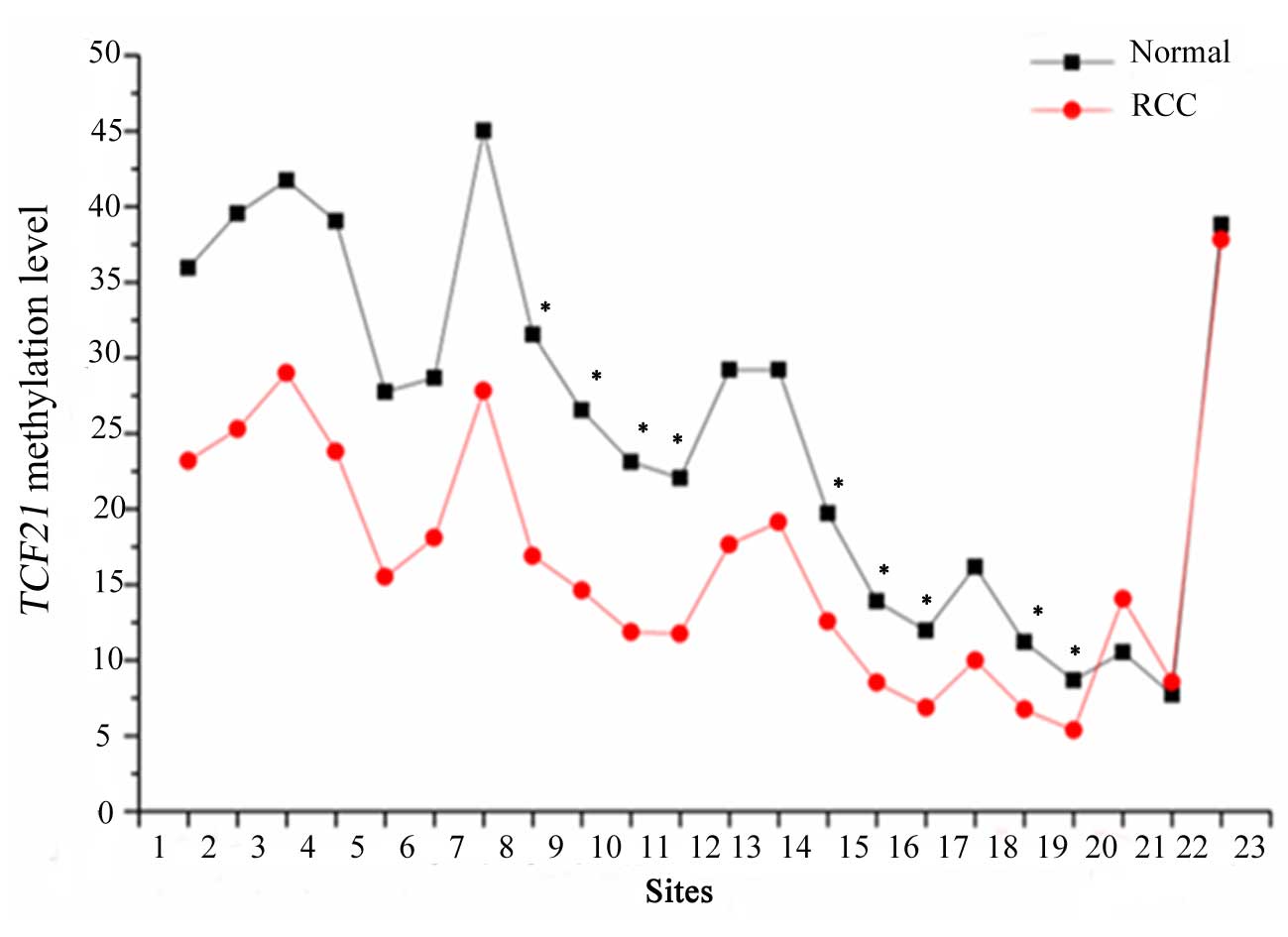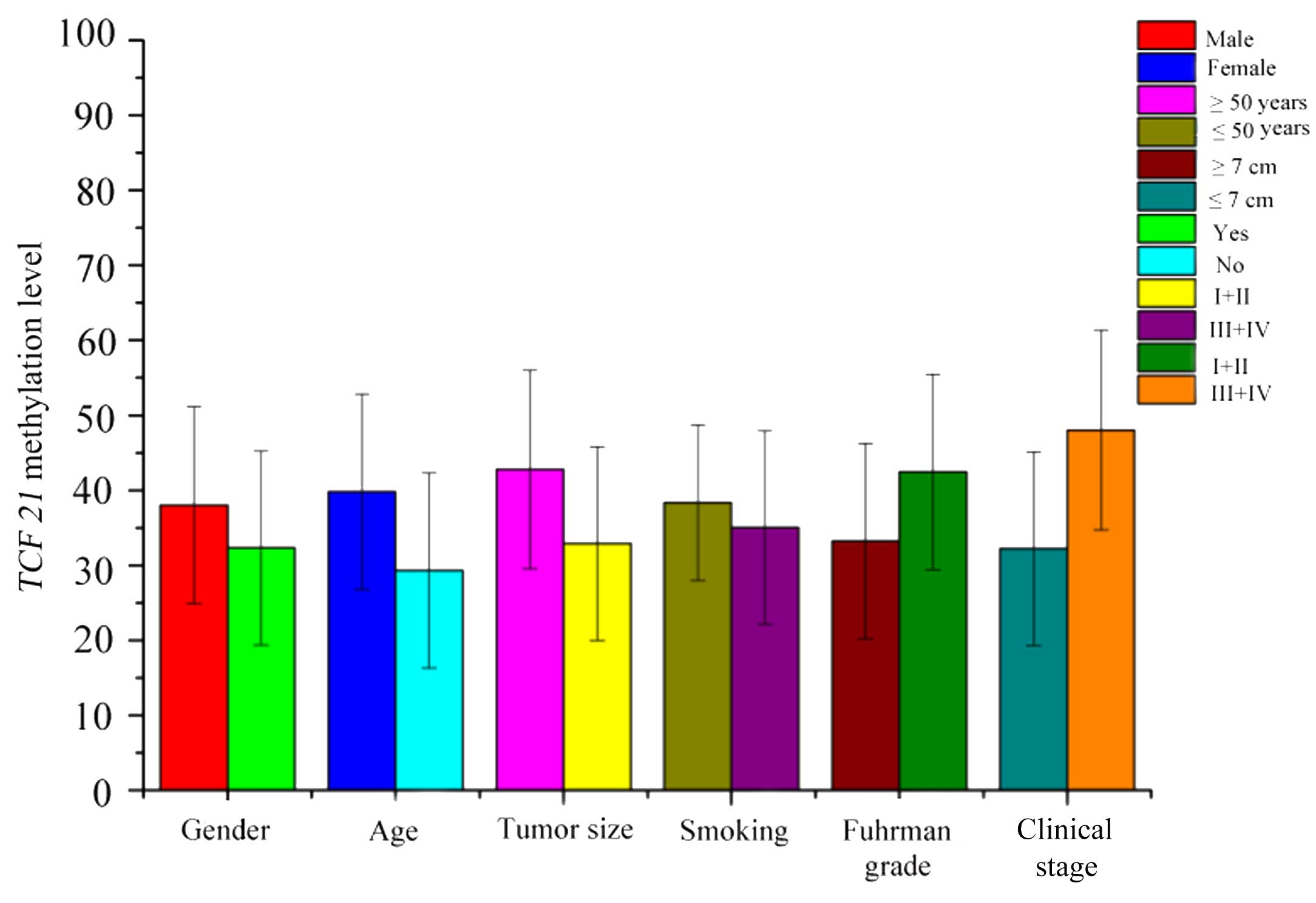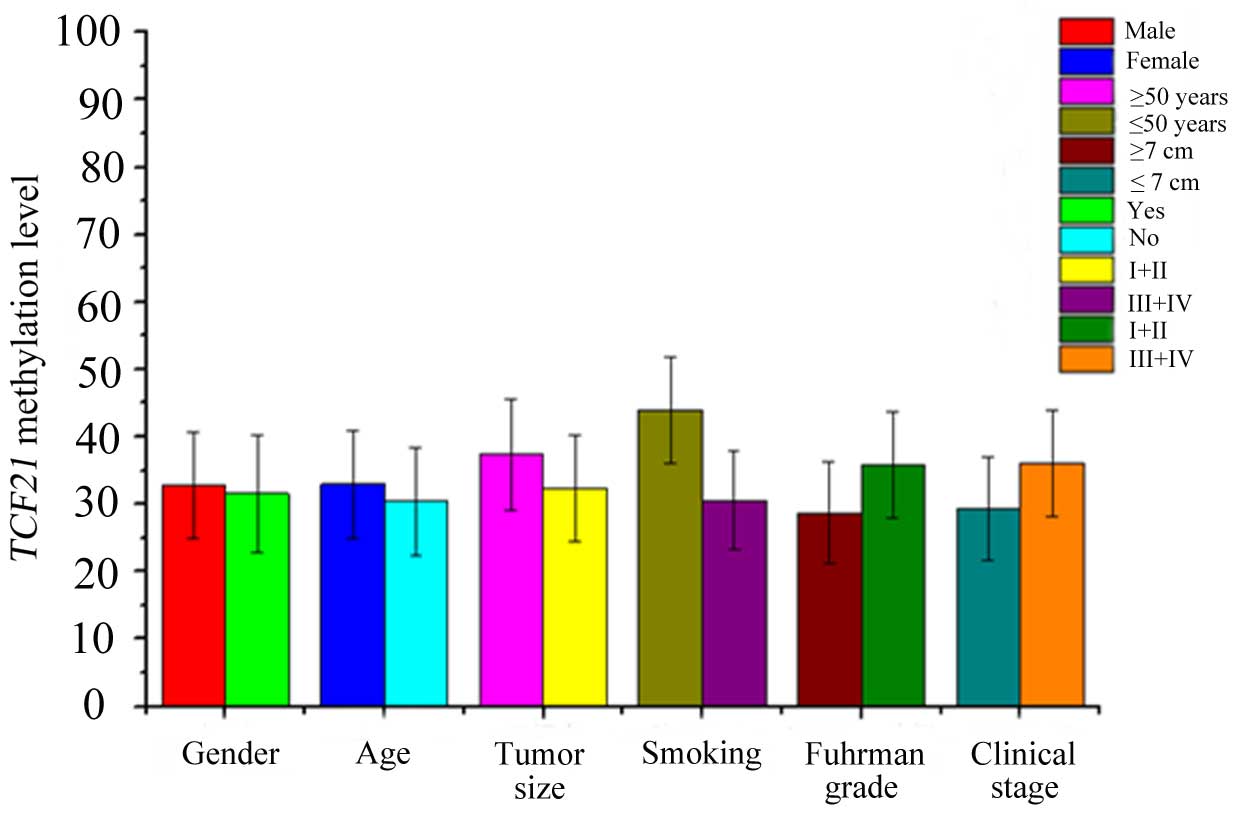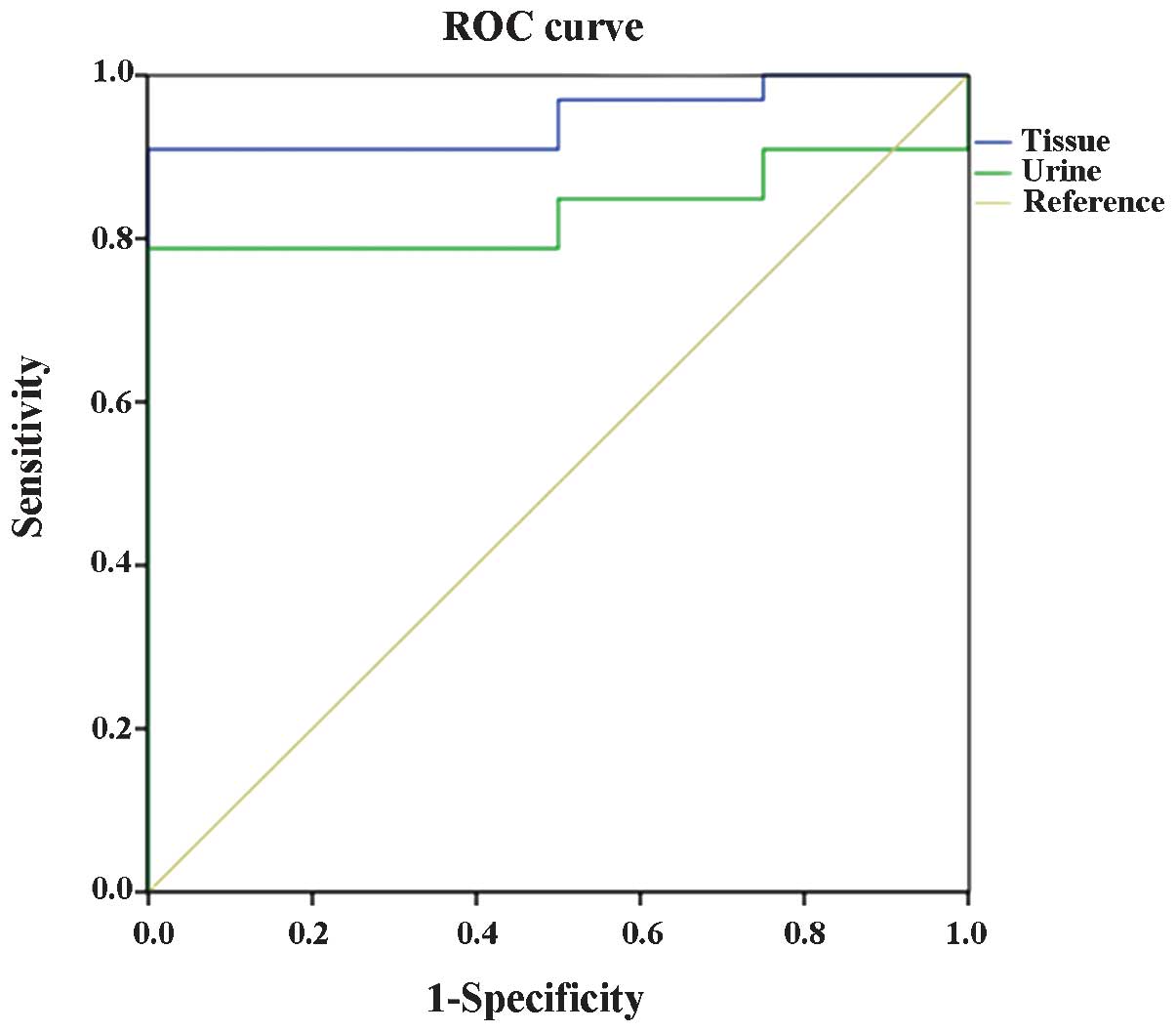|
1
|
Ljungberg B, Campbell SC, Choi HY, Jacqmin
D, Lee JE, Weikert S and Kiemeney LA: The epidemiology of renal
cell carcinoma. Eur Urol. 60:615–621. 2011. View Article : Google Scholar : PubMed/NCBI
|
|
2
|
Sachdeva K, Curti B and Bagi JRP: Renal
cell carcinoma. http://emedicine.medscape.com/article/281340-overviewAccessed.
May 17–2016
|
|
3
|
Maher ER: Genomics and epigenomics of
renal cell carcinoma. Semin Cancer Biol. 23:10–17. 2013. View Article : Google Scholar : PubMed/NCBI
|
|
4
|
Janzen NK, Kim HL, Figlin RA and
Belldegrun AS: Surveillance after radical or partial nephrectomy
for localized renal cell carcinoma and management of recurrent
disease. Urol Clin North Am. 30:843–852. 2003. View Article : Google Scholar : PubMed/NCBI
|
|
5
|
Ferlay J, Shin HR, Bray F, Forman D,
Mathers C and Parkin DM: Estimates of worldwide burden of cancer in
2008: GLOBOCAN 2008. Int J Cancer. 127:2893–2917. 2010. View Article : Google Scholar : PubMed/NCBI
|
|
6
|
Smith SJ, Bosniak MA, Megibow AJ, Hulnick
DH, Horii SC and Raghavendra BN: Renal cell carcinoma: Earlier
discovery and increased detection. Radiology. 170:699–703. 1989.
View Article : Google Scholar : PubMed/NCBI
|
|
7
|
Cairns P: Gene methylation and early
detection of genitourinary cancer: The road ahead. Nat Rev Cancer.
7:531–543. 2007. View
Article : Google Scholar : PubMed/NCBI
|
|
8
|
Scélo G and Brennan P: The epidemiology of
bladder and kidney cancer. Nat Clin Pract Urol. 4:205–217. 2007.
View Article : Google Scholar : PubMed/NCBI
|
|
9
|
Park SY, Kwon HJ, Lee HE, Ryu HS, Kim SW,
Kim JH, Kim IA, Jung N, Cho NY and Kang GH: Promoter CpG island
hypermethylation during breast cancer progression. Virchows Arch.
458:73–84. 2011. View Article : Google Scholar : PubMed/NCBI
|
|
10
|
Park JY: Promoter hypermethylation in
prostate cancer. Cancer Control. 17:245–255. 2010.PubMed/NCBI
|
|
11
|
Akhavan-Niaki H and Samadani AA: DNA
methylation and cancer development: Molecular mechanism. Cell
Biochem Biophys. 67:501–513. 2013. View Article : Google Scholar : PubMed/NCBI
|
|
12
|
Vucic EA, Brown CJ and Lam WL: Epigenetics
of cancer progression. Pharmacogenomics. 9:215–234. 2008.
View Article : Google Scholar : PubMed/NCBI
|
|
13
|
Duffy M, Napieralski R, Martens JW, Span
PN, Spyratos F, Sweep FC, Brunner N, Foekens JA and Schmitt M:
EORTC PathoBiology Group: Methylated genes as new cancer
biomarkers. Eur J Cancer. 45:335–346. 2009. View Article : Google Scholar : PubMed/NCBI
|
|
14
|
Herman JG and Baylin SB: Gene silencing in
cancer in association with promoter hypermethylation. N Engl J Med.
349:2042–2054. 2003. View Article : Google Scholar : PubMed/NCBI
|
|
15
|
Quaggin SE, Schwartz L, Cui S, Igarashi P,
Deimling J, Post M and Rossant J: The basic-helix-loop-helix
protein pod1 is critically important for kidney and lung
organogenesis. Development. 126:5771–5783. 1999.PubMed/NCBI
|
|
16
|
Ye YW, Jiang ZM, Li WH, Li ZS, Han YH, Sun
L, Wang Y, Xie J, Liu YC, Zhao J, et al: Down-regulation of TCF21
is associated with poor survival in clear cell renal cell
carcinoma. Neoplasma. 59:599–605. 2012. View Article : Google Scholar : PubMed/NCBI
|
|
17
|
Arab K, Smith LT, Gast A, Weichenhan D,
Huang JP, Claus R, Hielscher T, Espinosa AV, Ringel MD, Morrison
CD, et al: Epigenetic deregulation of TCF21 inhibits metastasis
suppressor KISS1 in metastatic melanoma. Carcinogenesis.
32:1467–1473. 2011. View Article : Google Scholar : PubMed/NCBI
|
|
18
|
Richards KL, Zhang B, Sun M, Dong W,
Churchill J, Bachinski LL, Wilson CD, Baggerly KA, Yin G, Hayes DN,
et al: Methylation of the candidate biomarker TCF21 is very
frequent across a spectrum of early-stage nonsmall cell lung
cancers. Cancer. 117:606–617. 2011. View Article : Google Scholar : PubMed/NCBI
|
|
19
|
Costa VL, Henrique R, Danielsen SA, Eknaes
M, Patrício P, Morais A, Oliveira J, Lothe RA, Teixeira MR, Lind GE
and Jerónimo C: TCF21 and PCDH17 methylation: An innovative panel
of biomarkers for a simultaneous detection of urological cancers.
Epigenetics. 6:1120–1130. 2011. View Article : Google Scholar : PubMed/NCBI
|
|
20
|
Shaw RJ, Liloglou T, Rogers SN, Brown JS,
Vaughan ED, Lowe D, Field JK and Risk JM: Promoter methylation of
P16, RARbeta, E-cadherin, cyclin A1 and cytoglobin in oral cancer:
Quantitative evaluation using pyrosequencing. Br J Cancer.
94:561–568. 2006. View Article : Google Scholar : PubMed/NCBI
|
|
21
|
Zisman A, Pantuck AJ, Dorey F, Said JW,
Shvarts O, Quintana D, Gitlitz BJ, deKernion JB, Figlin RA and
Belldegrun AS: Improved prognostication of renal cell carcinoma
using an integrated staging system. J Clin Oncol. 19:1649–1657.
2001.PubMed/NCBI
|
|
22
|
Lang H, Lindner V, de Fromont M, Molinié
V, Letourneux H, Meyer N, Martin M and Jacqmin D: Multicenter
determination of optimal interobserver agreement using the Fuhrman
grading system for renal cell carcinoma. Cancer. 103:625–629. 2005.
View Article : Google Scholar : PubMed/NCBI
|
|
23
|
Lam JS, Leppert JT, Belldegrun AS and
Figlin RA: Novel approaches in the therapy of metastatic renal cell
carcinoma. World J Urol. 23:202–212. 2005. View Article : Google Scholar : PubMed/NCBI
|
|
24
|
Yang XJ, Sugimura J, Schafernak KT,
Tretiakova MS, Han M, Vogelzang NJ, Furge K and Teh BT:
Classification of renal neoplasms based on molecular signatures. J
Urol. 175:2302–2306. 2006. View Article : Google Scholar : PubMed/NCBI
|
|
25
|
Jerónimo C, Henrique R and Sidransky D:
Uses of DNA methylation in cancer diagnosis and risk assessment.
DNA Methylation: Approaches, Methods and Applications. Esteller M:
(1st). CRC Press. (Boca Raton, FL). 11–26. 2004. View Article : Google Scholar
|
|
26
|
Henrique R, Luís AS and Jerónimo C: The
epigenetics of renal cell tumors: From biology to biomarkers. Front
Genet. 3:942012. View Article : Google Scholar : PubMed/NCBI
|
|
27
|
Jerónimo C and Henrique R: Epigenetic
biomarkers in urological tumors: A systematic review. Cancer Lett.
342:264–274. 2014. View Article : Google Scholar : PubMed/NCBI
|
|
28
|
Morris MR and Maher ER: Epigenetics of
renal cell carcinoma: The path towards new diagnostics and
therapeutics. Genome Med. 2:592010. View
Article : Google Scholar : PubMed/NCBI
|
|
29
|
Costa VL, Henrique R, Ribeiro FR, Pinto M,
Oliveira J, Lobo F, Teixeira MR and Jerónimo C: Quantitative
promoter methylation analysis of multiple cancer-related genes in
renal cell tumors. BMC Cancer. 7:1332007. View Article : Google Scholar : PubMed/NCBI
|
|
30
|
Morris MR, Ricketts C, Gentle D,
Abdulrahman M, Clarke N, Brown M, Kishida T, Yao M, Latif F and
Maher ER: Identification of candidate tumour suppressor genes
frequently methylated in renal cell carcinoma. Oncogene.
29:2104–2117. 2010. View Article : Google Scholar : PubMed/NCBI
|
|
31
|
Hoque MO, Begum S, Topaloglu O, Jeronimo
C, Mambo E, Westra WH, Califano JA and Sidransky D: Quantitative
detection of promoter hypermethylation of multiple genes in the
tumor, urine and serum DNA of patients with renal cancer. Cancer
Res. 64:5511–5517. 2004. View Article : Google Scholar : PubMed/NCBI
|
|
32
|
Morris MR, Ricketts CJ, Gentle D, McRonald
F, Carli N, Khalili H, Brown M, Kishida T, Yao M, Banks RE, et al:
Genome-wide methylation analysis identifies epigenetically
inactivated candidate tumour suppressor genes in renal cell
carcinoma. Oncogene. 30:1390–1401. 2011. View Article : Google Scholar : PubMed/NCBI
|
|
33
|
Smith LT, Lin M, Brena RM, Lang JC,
Schuller DE, Otterson GA, Morrison CD, Smiraglia DJ and Plass C:
Epigenetic regulation of the tumor suppressor gene TCF21 on
6q23-q24 in lung and head and neck cancer. Proc Natl Acad Sci USA.
103:982–987. 2006. View Article : Google Scholar : PubMed/NCBI
|
|
34
|
Quaggin SE, Vanden Heuvel GB and Igarashi
P: Pod-1, a mesoderm-specific basic-helix-loop-helix protein
expressed in mesenchymal and glomerular epithelial cells in the
developing kidney. Mech Dev. 71:37–48. 1998. View Article : Google Scholar : PubMed/NCBI
|
|
35
|
Quaggin SE, Schwartz L, Cui S, Igarashi P,
Deimling J, Post M and Rossant J: The basic-helix-loop-helix
protein pod1 is critically important for kidney and lung
organogenesis. Development. 126:5771–5783. 1999.PubMed/NCBI
|
|
36
|
Costa VL, Henrique R, Danielsen SA, Eknaes
M, Patricio P, Morais A, Olieira J, Lothe RA, Teixeira MR, Lind GE
and Jerónimo C: TCF21 and PCDH17 methylation: An innovative panel
of biomarkers for a simultaneous detection of urological cancers.
Epigenetics. 6:1120–1130. 2011. View Article : Google Scholar : PubMed/NCBI
|


















